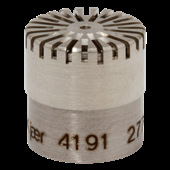
200V极化电压
Type 4191 is designed for high-precision, free-field measurements where a wide bandwidth is required. Being externally polarized, Type 4191 must be used with a classical preamplifier.
Uses
- Precision measurements to 40 kHz
- Premium class sound level meters
- Equipment complying with IEC 61672 class 1
Features
- Sensitivity: 12.5 mV/Pa
- Frequency: 3.15 Hz – 40 kHz
- Dynamic Range: 20 – 162 dB
- Temperature: – 30 to + 300°C (– 22to + 572°F)
- Polarization: 200 V
Use of free-field microphones
At higher frequencies reflections and diffractions causes a pressure increase in front of the diaphragm of a microphone. If not corrected for, this would result in an increased output voltage. A free-field optimisation means that the frequency response of the microphone has been designed in such a way that the free-field response at 0 degrees incidence is flat. This microphone is optimised for use with the protection grid in place.
Free-field microphones are commonly used for sound measurement in an anechoic chamber or far away from reflecting buildings, etc. Another area for free-field microphones is for general electroacoustic measurements like loudspeaker and microphone measurements.
With an upper frequency of 40 kHz, Type 4191 is especially suited all high-precision electroacoustic measurements as well as general acoustic measurements where a robust and stable free-field microphone is required. Despite the 40 kHz upper frequency, this microphone is optimised to operate with the protection grid in place.
Manufacturing and stabilityA press-fitted, stainless-steel diaphragm ensures superior long-term stability and mechanical robustness – Type 4191 will withstand the 1 m drop test of IEC 60068 – 2 – 32.
All Brüel & Kjær Measuring Microphones are assembled in a clean room. This ensures that the microphones maintain their inherent low noise floor and high stability, even when used in environments with a combination of high humidity and high temperature.
Polarization oltageType 4191 requires an external polarization voltage and must therefore be used with a classical preamplifier. Externally polarized microphones may be used at higher temperatures without severe changes in sensitivity.
Type 4191 is available in TEDS combinations with the classical Microphone Preamplifier Type 2669. The TEDS microphone is considered one unit and has been sealed in a clean environment. The TEDS is programmed with the loaded sensitivity of the actual cartridge and the data is therefore readily available. The default TEDS template is to IEEE P 1451.4 but TEDS to IEEE 1451.4 is available on request.
Inpidual calibration dataEach Type 4191 comes with an inpidual calibration chart including information about the open-circuit sensitivity, the free-field frequency response as well as the electrostatic actuator response.






